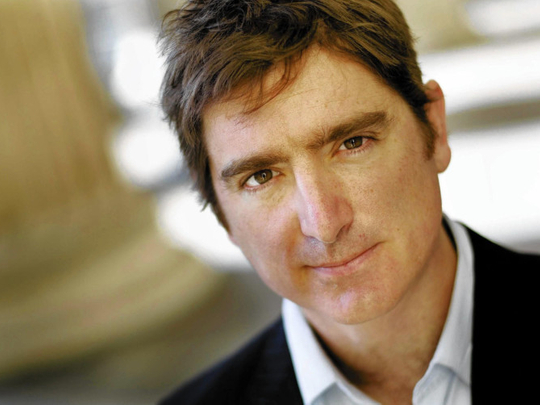
The paper chase that led to Marcel Theroux’s sixth novel began with what he calls “the biggest lacuna in all literature”: the mystery of what Jesus was doing between the ages of 13 and 30. Various legends have proliferated in that gap, but it was while exploring the idea that early Christianity is inflected with Buddhism that Theroux happened upon one of history’s fascinating obscurities: the Russian journalist and spy Nicolas Notovitch, who claimed to have discovered the answer. In 1894 he published a bestselling book called The Unknown Life of Jesus, his “translation” of a record of Jesus’s travels through India studying with Hindus and Buddhists. Notovitch had found this ancient Tibetan text, he explained, at a monastery in Ladakh, where he was recovering from a broken leg.
“I thought, what on earth is a Russian doing in that corner of the British empire in the 1880s?” says Theroux. “It’s totally mysterious, he can’t be up to any good.” This was also the time when the Russian secret service was setting up a branch in Paris to conduct “a kind of war on terror” against revolutionary elements — and the mysterious Notovitch seemed to be caught up in that too. A decade of obsession followed, and the result is The Secret Books, a rich stew of fiction with a tantalising basis in fact and some pertinent things to say about our present era’s relationship to propaganda and narrative manipulation, as well as the way “storytelling shapes the world we find ourselves in”.
Theroux’s wife, a former editor at his publisher Faber who now works in TV, came back from a books festival with a tote bag bearing the cheery quote “Stories are bridges to other worlds”. “I thought yes, but they are only as benign as the people who wield them. They are actually poisonous and vindictive and false as much as they are bridges. That was the controlling idea of the book.” Because Notovitch’s new gospel wasn’t the only secret book to come out of Russia’s fin de siecle: its dark twin in the novel, which has had a far more powerful afterlife, is the antisemitic forgery The Protocols of the Elders of Zion, first published in Russia in 1903.
“I’m not Jewish, so I’d never envisage myself writing a book where Jewish identity was a factor, but it hadn’t dawned on me the extent to which antisemitism is a creation of the Russian empire. To me The Protocols is the great fake news story of the last 200 years,” Theroux says. “Think about this: ex-KKK leader David Duke, who is one or two removes from Trump, says The Protocols is a real guide to the machinations of world Jewry in 2017. It’s like an undead curse, and the template for all other conspiracy theories.”
Of course, the curse goes back further still: antisemitism, as Theroux points out, is “encoded into the storytelling of the gospel writers”. The moment in Matthew when the crowd respond to Pilate washing his hands of responsibility for Jesus’s death with the cry “His blood be on us, and on our children”, reveals “the fake news writer, the Breitbart guy, the manipulation of story happening in the 2nd century AD. You make him the goodie, you make him the baddie, then set wheels in motion that have consequences 2,000 years later”.
Aptly for a book buzzing with conspiracies and conspiracy theories, it’s become unexpectedly timely over the course of its composition, as the rise offake news eats away at the lines between fiction and reality and reports of antisemitic attacks increase. “It is quite spooky,” Theroux admits. “I think of it in a Taoist way: if you follow your obsessions, you’ll match up with the flow of the universe.”
The novel also wrestles with fears about the purpose of fiction in a post-truth era: the novelist’s queasy feeling that “I’m surrounded by people who are lying about stuff, why add more fabulation, what on earth can that do?” There are several false starts as Theroux interjects himself into the narrative, changing the sex of characters, digressing into the joys and terrors of open-air swimming in his local south London lido and diverting into family history before the rollicking adventure story of the narrative proper kicks in.
“Usually when I write I have a separate book where I put my gloom and despondencies — the process of how the story emerges, the mess it comes out of. So I thought I’d incorporate some of that, like a Pompidou Centre of a novel, where some of the workings are on the outside.”
The most striking element in these meta-fictional hijinks is that rather than avoiding anachronism, like most historical novels, The Secret Books rejoices in it. In what he admits is a “Marmite” gambit, he repeatedly breaks the fictional spell: modern slang and technology pepper the page, the tsar is compared to Darth Vader, and characters direct each other to “check out my blog”.
“I did think about writing it as a conventional historical novel — ‘One morning, in 1887, Nicholas Notovitch woke up and yawned’ — and I just felt so despondent. I don’t want you to have that comfortable feeling that ‘this is an authentic reproduction of 19th-century France that bears no relation to the present day’. It’s happening now. History doesn’t stop. That’s a realisation of middle age — you develop an awareness that we’re in history in a really terrible way.”
Theroux is now nearly 50; he published his first novel, A Stranger in the Earth, when he was 30, but it was the follow-up, 2001’s The Paperchase, that he counts as his “first real book”. It was inspired by another fertile absence in literature, Sherlock Holmes’s cleverer brother Mycroft, but is more notable for drawing on the sibling rivalries of his own family. These included father Paul and uncle Alexander, writers whose fractious relationship has played out over decades through fictionalised memoirs and caustic book reviews, as well as his own relationship with his younger brother Louis, whose TV documentaries exploring the stranger corners of US society had already made him a star.
He wasn’t nervous at the time about fictionalising his family because “A, it’s not that much like them — I felt I changed it a lot — and B, Jesus, you lot have all been writing about each other for the last 20 years!” Nearly two decades on, rivalry remains “a scab you can pick at. You always have that in you. But if you go down the road of making comparisons ... One interviewer said: ‘You sound like your brother and you look like your brother, why aren’t you as successful as your brother?’ And I thought, wow, that’s amazing, why aren’t you as successful as my brother?!”
Theroux was born in Uganda, where his parents were both teaching, his father with the US Peace Corps, then in universities; his British mother, Anne Castle, with VSO. “They were idealistic, maybe with an element of the white saviour thing.” The family moved to south London, then boarding at Westminster from 13 offered “’early adulthood, some sense of independence”. He was friends there with Nick Clegg, “an amazing reader — him and Barack Obama must be the only two modern politicians who read novels”.
After studying English at Cambridge and international relations at Yale — “a bit of a dry biscuit”; he’d chosen it because it seemed more useful than literature — he spent some time “trying to sidestep being a writer. I wanted to write a novel but I didn’t want to say I did.” A “little bit of gloom and confusion, of the common or garden variety” — anxiety at the blank page of life opening up after the structures of formal education — sent him into psychoanalysis, which “opened up an internal space to think about writing”.
An awareness grew that if he didn’t do it now, he’d regret never trying: “No one’s going to give you permission. There’s no point at which someone says it’s time to write a novel.” Weighing up the anxiety of influence against the example of family role models, he agrees it’s probably easier to get started when books are the family profession. You have “a notion of what it involves, some practical sense. Also I can ring my dad up and say ‘I’m stuck’ or ‘I’ve got a terrible review’ and he’s a good corner man. But I don’t read too much of my dad’s stuff because I feel like I’ve already got quite a lot of it in my brain. There’s a slight anxiety: ‘Who wrote that sentence?’”
He is “steering clear” of his father’s forthcoming Mother Land, a novel about a controlling matriarch and her seven children, which bears inescapable similarities to the older Theroux generation and was described by Stephen King in the New York Times as ”an exercise in mean-spirited score-settling”. “Diplomatically it’s a bit of ano win,” Theroux says. “If I read it and like it I’m going to piss off my family, and if I read it and don’t like it I’m going to upset my dad. I’d much rather be friends with everyone.
“My dad has a devilish streak,” he admits, in reference to his childhood experience of having his diaries mined for material (Theroux senior’s line at the time: “I’ve got a chit from matron”). His own children are now nine and 11: would you do that to them? “No, no!” Does that mean you have less of a splinter of ice in your heart? “Yeah, I guess I have.”
One unambiguous benefit of having Paul Theroux as a father was his recommendation of Marcel’s 2009 novel Far North to Haruki Murakami, who was so impressed that he translated it into Japanese. “I don’t know if he’s taken liberties with the translation,” Theroux says. “Better not to know. If you translated it back into English, it would have sold more in the UK than the original.”
A survival story set in Siberia after the world has been overturned by climate change, the novel brings warmth, humanity and otherworldliness to an often grim genre and was shortlisted for the Arthur C. Clarke award. It was followed by 2013’s Strange Bodies, an ingenious metaphysical investigation into consciousness and reincarnation as well as a fiendishly high-concept slice of SF. “I love genre — high genre, that takes good writing seriously,” Theroux says. “It’s got to be entertaining. I take a certain amount of pride in set-ups and payoffs and reversals. That’s why I read, I love that stuff. Enchantment is a really powerful tool, and maybe in literary fiction we don’t talk enough about that.”
Throughout his writing career Theroux has travelled extensively as a documentary maker and journalist. “When you first write a book your fantasy is that you’ll be able to stay in a cottage and write deathless prose; actually you have to make deals with the world to earn a living. It’s good to be in the world and reflect about history. Being so solitary isn’t good for your mental health. Writers do get crazy and weird.” But he’s now grounded by marriage and children, comfortably settled in a corner of south London that feels reminiscent of his own childhood. “I like that it feels normal. Normality is good, isn’t it, in life. Keep the life normal, and keep the work weird. You don’t want to do it the other way round.”
–Guardian News & Media Ltd
The Secret Books is published by Faber.









